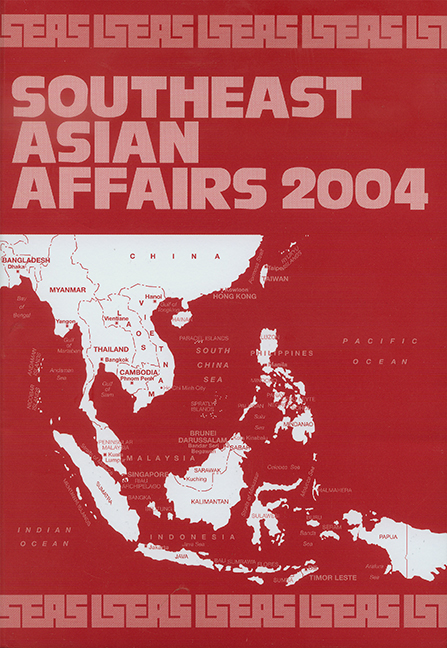Indonesia: Continuing Challenges and Fragile Stability
from INDONESIA
Published online by Cambridge University Press: 21 October 2015
Summary
Megawati Soekarnoputri assumed the presidency on 23 July 2001. This article examines Indonesia under Megawati in the year 2003, with special reference to the political situation, economic performance, and foreign policy. It also addresses the problems and prospects faced by Megawati.
The Political Situation
The political situation in Indonesia in 2003 can be described as stable despite the terrorist attack in Jakarta, sectarian conflict in Poso, and the Indonesian military operation in Aceh. The year was overshadowed by the impending 2004 election as most political parties were making preparations for this important occasion.
Marriott Hotel Bombing and Radical Islam
The Bali bomb blast on 12 October 2002 shocked the world. The Indonesian government, which had continued to deny that there was a terrorist network in Indonesia, now had to openly admit its existence. This led to an antiterrorist law being issued, known as Perpu No. 1/2002, giving the police more power to detain terrorist suspects. In 2003 this law was replaced by Undang-Undang No. 15/2003 tentang Pemberantasan Tindak Pidana Terrorisme [Law No. 15/2003 on the Elimination of Terrorism]. Nevertheless, the new anti-terrorist law did not stop another terrorist attack on the JW Marriott Hotel in Jakarta on 5 October 2003.
This bombing was the largest since the Bali bomb blast, which resulted in twelve people dead and 147 wounded. Like the Bali bombing last year, the attack was carried out by Jemaah Islamiyah (JI), a terrorist organization using Islam as its “ideology”. Many believe that the JI is not only a regional organization but is linked to Al-Qaeda of Osama bin Laden. Unlike the Bali bomb blast in which the majority of the victims were foreigners, especially Australians, the majority of the Jakarta victims were Indonesians. The Jakarta bombing had two consequences: on the one hand, it instilled fear among Indonesians that the JI would be able to strike any time; on the other hand, it strengthened the military/police grip over the security situation.
- Type
- Chapter
- Information
- Southeast Asian Affairs 2004 , pp. 89 - 103Publisher: ISEAS–Yusof Ishak InstitutePrint publication year: 2004



